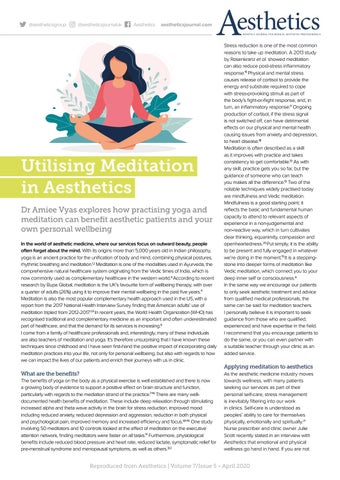@aestheticsgroup
@aestheticsjournaluk
Aesthetics
aestheticsjournal.com
Utilising Meditation in Aesthetics Dr Amiee Vyas explores how practising yoga and meditation can benefit aesthetic patients and your own personal wellbeing In the world of aesthetic medicine, where our services focus on outward beauty, people often forget about the mind. With its origins more than 5,000 years old in Indian philosophy, yoga is an ancient practice for the unification of body and mind, combining physical postures, rhythmic breathing and meditation.1,2 Meditation is one of the modalities used in Ayurveda, the comprehensive natural healthcare system originating from the Vedic times of India, which is now commonly used as complementary healthcare in the western world.3 According to recent research by Bupa Global, meditation is the UK’s favourite form of wellbeing therapy, with over a quarter of adults (26%) using it to improve their mental wellbeing in the past five years.4 Meditation is also the most popular complementary health approach used in the US, with a report from the 2017 National Health Interview Survey finding that American adults’ use of meditation tripled from 2012-2017.2,5 In recent years, the World Health Organization (WHO) has recognised traditional and complementary medicine as an important and often underestimated part of healthcare, and that the demand for its services is increasing.6 I come from a family of healthcare professionals and, interestingly, many of these individuals are also teachers of meditation and yoga. It’s therefore unsurprising that I have known these techniques since childhood and I have seen first-hand the positive impact of incorporating daily meditation practices into your life, not only for personal wellbeing, but also with regards to how we can impact the lives of our patients and enrich their journeys with us in clinic.
Stress reduction is one of the most common reasons to take up meditation. A 2013 study by Rosenkranz et al. showed meditation can also reduce post-stress inflammatory response.16 Physical and mental stress causes release of cortisol to provide the energy and substrate required to cope with stress-provoking stimuli as part of the body’s fight-or-flight response, and, in turn, an inflammatory response.17 Ongoing production of cortisol, if the stress signal is not switched off, can have detrimental effects on our physical and mental health causing issues from anxiety and depression, to heart disease.18 Meditation is often described as a skill as it improves with practice and takes consistency to get comfortable.19 As with any skill, practice gets you so far, but the guidance of someone who can teach you makes all the difference.19 Two of the notable techniques widely practised today are mindfulness and Vedic meditation. Mindfulness is a good starting point; it reflects the basic and fundamental human capacity to attend to relevant aspects of experience in a non-judgemental and non-reactive way, which in turn cultivates clear thinking, equanimity, compassion and openheartedness.20 Put simply, it is the ability to be present and fully engaged in whatever we’re doing in the moment.19 It is a steppingstone into deeper forms of meditation like Vedic meditation, which connect you to your deep inner self or consciousness.3 In the same way we encourage our patients to only seek aesthetic treatment and advice from qualified medical professionals, the same can be said for meditation teachers. I personally believe it is important to seek guidance from those who are qualified, experienced and have expertise in the field. I recommend that you encourage patients to do the same, or you can even partner with a suitable teacher through your clinic as an added service.
Applying meditation to aesthetics What are the benefits? The benefits of yoga on the body as a physical exercise is well established and there is now a growing body of evidence to support a positive effect on brain structure and function, particularly with regards to the mediation strand of the practice.7-10 There are many welldocumented health benefits of meditation. These include deep relaxation through stimulating increased alpha and theta wave activity in the brain for stress reduction, improved mood including reduced anxiety, reduced depression and aggression, reduction in both physical and psychological pain, improved memory and increased efficiency and focus.3,11-15 One study involving 50 meditators and 10 controls looked at the effect of meditation on the executive attention network, finding meditators were faster on all tasks.14 Furthermore, physiological benefits include reduced blood pressure and heart rate, reduced lactate, symptomatic relief for pre-menstrual syndrome and menopausal symptoms, as well as others.3,12
As the aesthetic medicine industry moves towards wellness, with many patients seeking our services as part of their personal self-care, stress management is inevitably filtering into our work in clinics. Self-care is understood as peoples’ ability to care for themselves physically, emotionally and spiritually.21 Nurse prescriber and clinic owner Julie Scott recently stated in an interview with Aesthetics that emotional and physical wellness go hand in hand. If you are not
Reproduced from Aesthetics | Volume 7/Issue 5 - April 2020


















